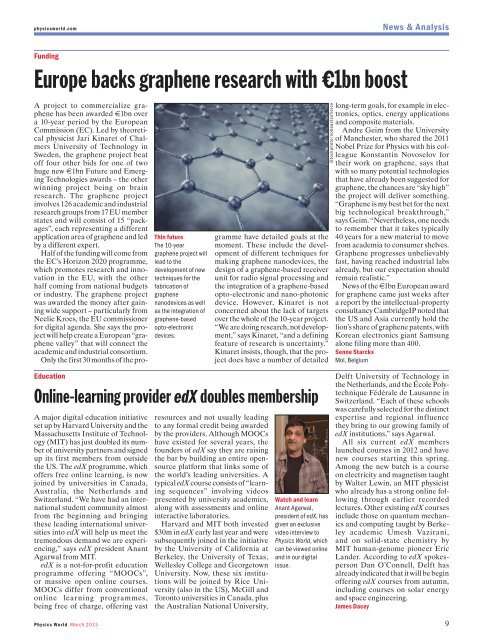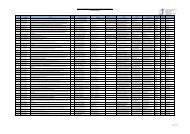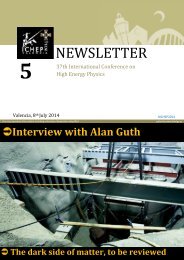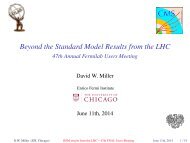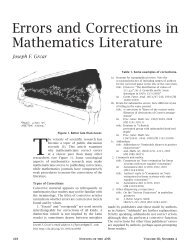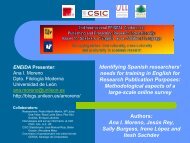PW_mar13_sample_issue
PW_mar13_sample_issue
PW_mar13_sample_issue
Create successful ePaper yourself
Turn your PDF publications into a flip-book with our unique Google optimized e-Paper software.
physicsworld.com<br />
Funding<br />
Europe backs graphene research with €1bn boost<br />
A project to commercialize graphene<br />
has been awarded 71bn over<br />
a 10-year period by the European<br />
Commission (EC). Led by theoretical<br />
physicist Jari Kinaret of Chalmers<br />
University of Technology in<br />
Sweden, the graphene project beat<br />
off four other bids for one of two<br />
huge new 71bn Future and Emerging<br />
Technologies awards – the other<br />
winning project being on brain<br />
research. The graphene project<br />
involves 126 academic and industrial<br />
research groups from 17 EU member<br />
states and will consist of 15 “packages”,<br />
each representing a different<br />
application area of graphene and led<br />
by a different expert.<br />
Half of the funding will come from<br />
the EC’s Horizon 2020 programme,<br />
which promotes research and innovation<br />
in the EU, with the other<br />
half coming from national budgets<br />
or industry. The graphene project<br />
was awarded the money after gaining<br />
wide support – particularly from<br />
Neelie Kroes, the EU commissioner<br />
for digital agenda. She says the project<br />
will help create a European “graphene<br />
valley” that will connect the<br />
academic and industrial consortium.<br />
Only the first 30 months of the pro-<br />
Thin future<br />
The 10-year<br />
graphene project will<br />
lead to the<br />
development of new<br />
techniques for the<br />
fabrication of<br />
graphene<br />
nanodevices as well<br />
as the integration of<br />
graphene-based<br />
opto-electronic<br />
devices.<br />
gramme have detailed goals at the<br />
moment. These include the development<br />
of different techniques for<br />
making graphene nanodevices, the<br />
design of a graphene-based receiver<br />
unit for radio signal processing and<br />
the integration of a graphene-based<br />
opto-electronic and nano-photonic<br />
device. However, Kinaret is not<br />
concerned about the lack of targets<br />
over the whole of the 10-year project.<br />
“We are doing research, not development,”<br />
says Kinaret, “and a defining<br />
feature of research is uncertainty.”<br />
Kinaret insists, though, that the project<br />
does have a number of detailed<br />
Education<br />
Online-learning provider edX doubles membership<br />
A major digital education initiative<br />
set up by Harvard University and the<br />
Massachusetts Institute of Technology<br />
(MIT) has just doubled its number<br />
of university partners and signed<br />
up its first members from outside<br />
the US. The edX programme, which<br />
offers free online learning, is now<br />
joined by universities in Canada,<br />
Australia, the Netherlands and<br />
Switzerland. “We have had an international<br />
student community almost<br />
from the beginning and bringing<br />
these leading international universities<br />
into edX will help us meet the<br />
tremendous demand we are experiencing,”<br />
says edX president Anant<br />
Agarwal from MIT.<br />
edX is a not-for-profit education<br />
programme offering “MOOCs”,<br />
or massive open online courses.<br />
MOOCs differ from conventional<br />
online learning programmes,<br />
being free of charge, offering vast<br />
resources and not usually leading<br />
to any formal credit being awarded<br />
by the providers. Although MOOCs<br />
have existed for several years, the<br />
founders of edX say they are raising<br />
the bar by building an entire opensource<br />
platform that links some of<br />
the world’s leading universities. A<br />
typical edX course consists of “learning<br />
sequences” involving videos<br />
presented by university academics,<br />
along with assessments and online<br />
interactive laboratories.<br />
Harvard and MIT both invested<br />
$30m in edX early last year and were<br />
subsequently joined in the initiative<br />
by the University of California at<br />
Berkeley, the University of Texas,<br />
Wellesley College and Georgetown<br />
University. Now, these six institutions<br />
will be joined by Rice University<br />
(also in the US), McGill and<br />
Toronto universities in Canada, plus<br />
the Australian National University,<br />
Watch and learn<br />
Anant Agarwal,<br />
president of edX, has<br />
given an exclusive<br />
video interview to<br />
Physics World, which<br />
can be viewed online<br />
and in our digital<br />
<strong>issue</strong>.<br />
News & Analysis<br />
long-term goals, for example in electronics,<br />
optics, energy applications<br />
and composite materials.<br />
Andre Geim from the University<br />
of Manchester, who shared the 2011<br />
Nobel Prize for Physics with his col-<br />
league Konstantin Novoselov for<br />
their work on graphene, says that<br />
with so many potential technologies<br />
that have already been suggested for<br />
graphene, the chances are “sky high”<br />
the project will deliver something.<br />
“Graphene is my best bet for the next<br />
big technological breakthrough,”<br />
says Geim. “Nevertheless, one needs<br />
to remember that it takes typically<br />
40 years for a new material to move<br />
from academia to consumer shelves.<br />
Graphene progresses unbelievably<br />
fast, having reached industrial labs<br />
already, but our expectation should<br />
remain realistic.”<br />
News of the 71bn European award<br />
for graphene came just weeks after<br />
a report by the intellectual-property<br />
consultancy CambridgeIP noted that<br />
the US and Asia currently hold the<br />
lion’s share of graphene patents, with<br />
Korean electronics giant Samsung<br />
alone filing more than 400.<br />
Senne Starckx<br />
Mol, Belgium<br />
Delft University of Technology in<br />
the Netherlands, and the École Polytechnique<br />
Fédérale de Lausanne in<br />
Switzerland. “Each of these schools<br />
was carefully selected for the distinct<br />
expertise and regional influence<br />
they bring to our growing family of<br />
edX institutions,” says Agarwal.<br />
All six current edX members<br />
launched courses in 2012 and have<br />
new courses starting this spring.<br />
Among the new batch is a course<br />
on electricity and magnetism taught<br />
by Walter Lewin, an MIT physicist<br />
who already has a strong online following<br />
through earlier recorded<br />
lectures. Other existing edX courses<br />
include those on quantum mechanics<br />
and computing taught by Berkeley<br />
academic Umesh Vazirani,<br />
and on solid-state chemistry by<br />
MIT human-genome pioneer Eric<br />
Lander. According to edX spokesperson<br />
Dan O’Connell, Delft has<br />
already indicated that it will be begin<br />
offering edX courses from autumn,<br />
including courses on solar energy<br />
and space engineering.<br />
James Dacey<br />
Physics World March 2013 9<br />
iStockphoto/nobeastsofierce


